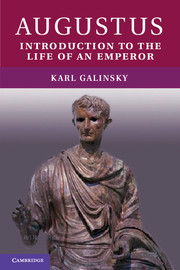Book contents
- Frontmatter
- Contents
- List of Maps, Genealogical Chart, and Illustrations
- Maps & Genealogical Chart
- Timeline
- Note on Major Ancient Sources
- Preface
- 1 From Velitrae To Caesar’s Heir
- 2 Power Struggles and Civil War
- 3 The Experiment of the Principate
- 4 The Challenge of Pax Augusta
- 5 Augustus at Home
- 6 Cultural Vitality
- 7 The Augustan Empire
- 8 The Final Days and an Assessment
- Select Bibliography and References for Further Reading
- Index
- Index of Passages and Inscriptions
7 - The Augustan Empire
Unity and Diversity
Published online by Cambridge University Press: 05 February 2013
- Frontmatter
- Contents
- List of Maps, Genealogical Chart, and Illustrations
- Maps & Genealogical Chart
- Timeline
- Note on Major Ancient Sources
- Preface
- 1 From Velitrae To Caesar’s Heir
- 2 Power Struggles and Civil War
- 3 The Experiment of the Principate
- 4 The Challenge of Pax Augusta
- 5 Augustus at Home
- 6 Cultural Vitality
- 7 The Augustan Empire
- 8 The Final Days and an Assessment
- Select Bibliography and References for Further Reading
- Index
- Index of Passages and Inscriptions
Summary
General Perspectives
When we look at Augustus’ Roman empire, the same perspectives apply as on most Augustan phenomena: there had been substantive prior developments that Augustus continued and, at the same time, fundamentally changed. Symptomatic of this process is the Romans’ use of imperium: before Augustus, it did not connote territorial empire but simply the power exercised by the Roman people, analogous to the imperium of Roman magistrates. In his Res Gestae, imperium populi Romani appears for the first time as a territorial entity: “When throughout the whole imperium of the Roman people pax had been achieved on land and sea by victories” (13). It is again typical of the Augustan blend of tradition and innovation that in the other seven mentions of imperium in the Res Gestae, the word, as before, means “power” (Richardson 2008, 118–19).
The shift reflects Augustus’ view of the empire as a unified entity rather than a mere agglomeration of territories under Roman control as had been the case in republican times. Establishing that sense of cohesiveness and community, or at least a noticeable degree of it, was indeed a hallmark of his reign. Again, we are dealing with a process rather than a fixed outcome – one of the problems with the convenient term “Romanization” is that it expresses both – and, just as typical, it was not a process aiming at homogeneity. And, again characteristic of Augustus, it was not a policy announced by official proclamation. Neither was he the sole agent; effecting change was a matter of mutual contributions and depended on the provincials and Italians more than on him. The exact degree of this interaction was variable and eludes attempts to pin it down precisely. Its dynamic, however, shaped the Roman empire of Augustus, and of successors like Trajan and Hadrian, and was basic to its vitality.
- Type
- Chapter
- Information
- AugustusIntroduction to the Life of an Emperor, pp. 159 - 175Publisher: Cambridge University PressPrint publication year: 2012



